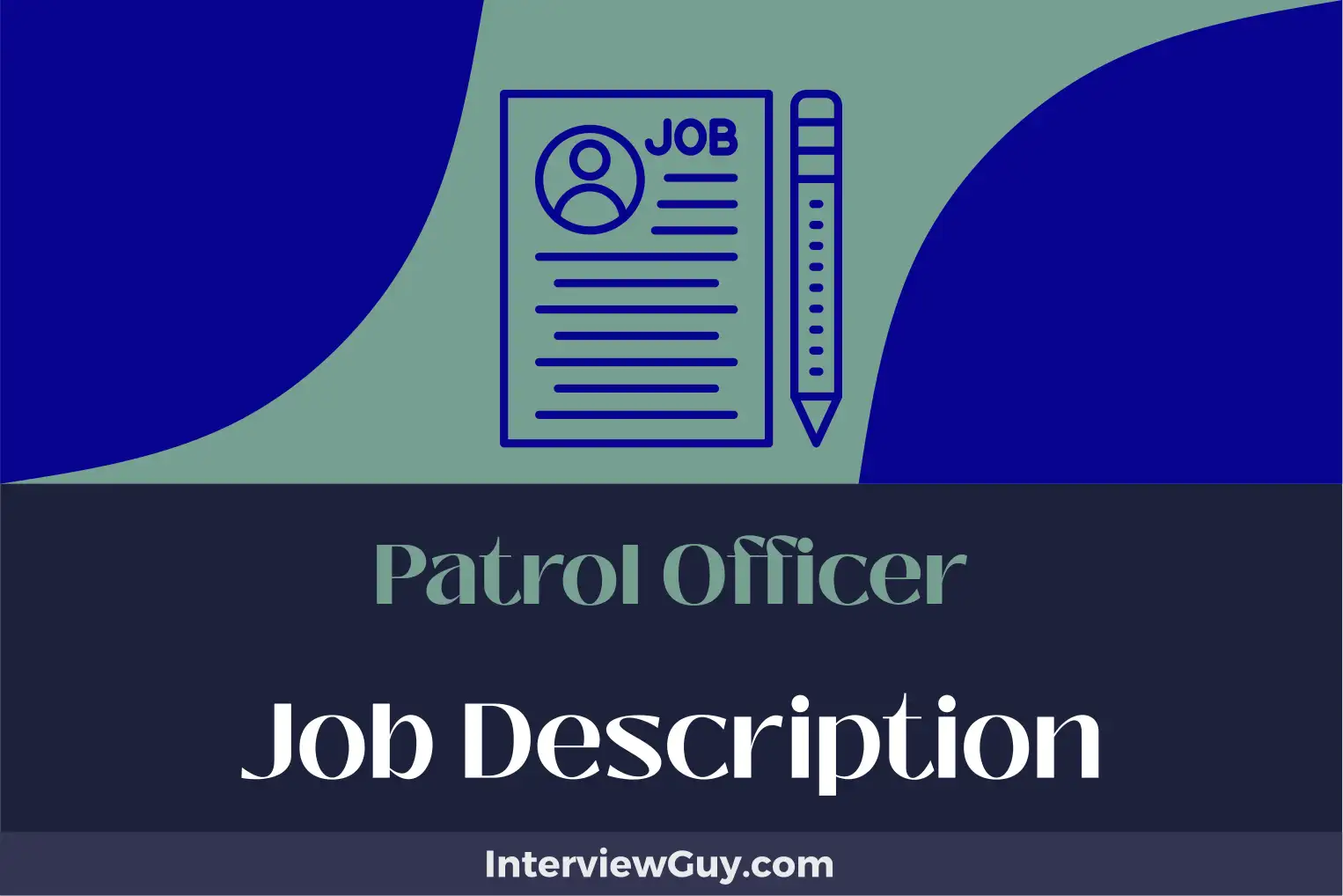Patrol Officer Job Description [Updated for 2026]

In an increasingly safety-conscious society, the focus on patrol officers has never been more critical.
As society evolves, so does the demand for skilled individuals who can safeguard, monitor, and protect our communities.
But let’s delve deeper: What’s truly expected from a patrol officer?
Whether you are:
- A job seeker trying to understand the complexities of this role,
- A hiring manager aiming to outline the ideal candidate,
- Or simply interested in the day-to-day responsibilities of a patrol officer,
You’re in the right place.
Today, we present a customizable patrol officer job description template, designed for effortless posting on job boards or career sites.
Let’s get started.
Patrol Officer Duties and Responsibilities
Patrol Officers are a vital part of the law enforcement community, responsible for maintaining order, responding to emergencies, and enforcing motor vehicle and criminal laws.
They are often the first responders in cases of crime or accidents.
Their duties and responsibilities include:
- Conduct routine patrols in assigned areas
- Respond promptly to calls for assistance and emergencies
- Enforce local, state, and federal laws and ordinances
- Monitor traffic and issue citations for violations
- Investigate suspicious activities and individuals
- Apprehend and arrest suspects, following proper procedures
- Collect evidence and statements at crime or accident scenes
- Complete detailed reports and paperwork
- Provide testimony in court
- Assist in crime prevention and safety initiatives
- Perform first aid and CPR when necessary
- Communicate effectively with the public and provide information or assistance
Patrol Officer Job Description Template
Job Brief
We are looking for a dedicated Patrol Officer to maintain peace, enforce laws and ordinances, protect life and property, and carry out administrative duties.
Patrol Officer responsibilities include patrolling assigned areas, responding to emergencies, conducting traffic stops, issuing citations, and making arrests.
Our ideal candidate is someone with a strong sense of responsibility, exemplary moral character, and excellent interpersonal skills.
Ultimately, the role of the Patrol Officer is to ensure the security and safety of our community and its residents.
Responsibilities
- Patrol designated areas in a vehicle or on foot
- Respond to emergency calls and requests for assistance
- Investigate suspicious persons and activities
- Enforce local, state, and federal laws and ordinances
- Conduct traffic stops and issue citations
- Arrest violators and suspects when necessary
- Compile daily reports and fill out forms
- Provide first aid and medical attention as needed
- Testify in court as required
Qualifications
- High school diploma or equivalent
- Completion of a law enforcement academy
- Valid state driver’s license
- Physical ability to perform job tasks, including handling of heavy equipment
- Excellent interpersonal and communication skills
- Sound judgement and decision-making skills
- Ability to remain calm in high-pressure situations
- Knowledge of first aid and CPR preferred
Benefits
- Health insurance
- Dental insurance
- Retirement plan
- Paid time off
- Uniform allowance
- Opportunities for advancement
Additional Information
- Job Title: Patrol Officer
- Work Environment: Mostly outdoor work in various weather conditions. Shift work including nights, weekends, and holidays.
- Reporting Structure: Reports to a Police Sergeant or other designated supervisor.
- Salary: Salary is based upon candidate experience and qualifications, as well as market and business considerations.
- Pay Range: $40,000 minimum to $70,000 maximum
- Location: [City, State] (specify the location or indicate if remote)
- Employment Type: Full-time
- Equal Opportunity Statement: We are an equal opportunity employer and value diversity at our company. We do not discriminate on the basis of race, religion, color, national origin, gender, sexual orientation, age, marital status, veteran status, or disability status.
- Application Instructions: Please submit your resume, cover letter, and any relevant certifications to [email address or application portal].
What Does a Patrol Officer Do?
Patrol Officers, also known as Police Officers, are typically employed by local, state, or federal law enforcement agencies.
Their primary duty is to protect the lives and property of the people within their jurisdiction.
They do this by patrolling specific areas, enforcing laws and regulations, and responding to emergency calls.
On a typical day, a Patrol Officer might be involved in traffic control, initial crime scene response, and conducting preliminary investigations.
They regularly interact with the public to assist with disputes, domestic issues, and other problems that may arise.
They also often testify in court, write detailed reports, and may conduct follow-ups on previous cases.
Another aspect of their job can involve working with other law enforcement agencies and community organizations to prevent crime and maintain public safety.
Overall, the role of a Patrol Officer is a mix of law enforcement, public service, and community relations.
Patrol Officer Qualifications and Skills
A Patrol Officer should possess a variety of skills and qualifications for effective execution of their duties, such as:
- Physical fitness and agility to pursue, detain, and manage suspects and to be able to perform duties such as foot patrol and traffic control.
- Strong observation skills to detect crimes, suspicious activities, and any potential threats to public safety.
- Knowledge of law enforcement principles and procedures, including understanding of legal codes, court procedures, and law enforcement information systems.
- Effective communication skills to interact with the public, victims, witnesses, and suspects; to give testimony in court; and to write detailed reports.
- Problem-solving skills to analyze situations swiftly and objectively and determine the proper course of action to be taken.
- Interpersonal skills to work effectively with diverse community members, colleagues, and other stakeholders, often under stressful conditions.
- Emotional intelligence and resilience to manage stress and remain calm in challenging situations.
- Willingness to work irregular hours, including nights, weekends, and public holidays.
- Valid driver’s license and the ability to operate various types of law enforcement vehicles.
Patrol Officer Experience Requirements
Entry-level patrol officer candidates typically need to have completed a police academy program, which provides them with a foundation of law enforcement knowledge and practical training.
Prior to this, many aspiring patrol officers gain experience through internships at local law enforcement agencies or by participating in ride-along programs.
In such roles, they learn basic skills, protocols, and procedures.
Candidates with 1 to 2 years of experience may have served in roles such as a Police Aide or Cadet, gaining on-the-job experience and further deepening their understanding of law enforcement operations.
Those with more than 3 years of experience often have developed their tactical skills, community engagement, and crisis management abilities in patrol officer roles or related law enforcement positions.
Candidates with more than 5 years of experience may have some leadership experience, possibly having served as a Field Training Officer or in a supervisory role.
These individuals may be ready for more senior or specialized roles within law enforcement, such as a Detective or Sergeant role.
Regardless of experience level, continuous training and learning are important, as patrol officers must stay updated on laws, enforcement strategies, and public safety protocols.
Patrol Officer Education and Training Requirements
To become a Patrol Officer, individuals usually need a high school diploma or equivalent qualification.
Some departments may require patrol officers to hold an associate’s or bachelor’s degree in criminal justice, law enforcement, or a related field.
Before being hired, candidates must complete a rigorous training program at a police academy.
This typically includes classroom instruction on topics like constitutional law and civil rights, along with physical training to improve fitness, self-defense skills, and firearm handling.
Patrol officers must also successfully complete a series of written and physical exams, drug tests, and a background check.
Some police departments require their officers to gain experience as a police cadet or in a related job before becoming a patrol officer.
In addition to these requirements, patrol officers should have excellent interpersonal communication skills as they interact with the public on a regular basis.
They should also be in good physical condition as the job often requires strenuous activities.
Continuing education and training are also crucial for patrol officers, as it helps them stay updated on new laws, regulations and enforcement techniques.
While not always required, some patrol officers choose to pursue advanced degrees or certifications in law enforcement or criminal justice to enhance their career prospects and acquire additional expertise.
Patrol Officer Salary Expectations
A Patrol Officer can expect to make an average of $52,810 (USD) per year.
The actual salary a Patrol Officer earns may vary depending on experience, geographical location, and department size.
Patrol Officer Job Description FAQs
What skills does a patrol officer need?
Patrol officers should have good physical fitness and mental resilience to deal with potentially dangerous situations.
They should also possess strong communication skills to interact effectively with the public and their colleagues.
Problem-solving and decision-making skills are crucial, as patrol officers often need to make split-second decisions.
Knowledge of law enforcement principles and human behavior is also necessary.
Do patrol officers need a degree?
In many police departments, a high school diploma or equivalent is the minimum educational requirement for patrol officers.
However, some departments may require or prefer candidates with a degree in criminal justice or a related field.
Regardless of their education level, all patrol officers must complete a police academy program.
What should you look for in a patrol officer resume?
A patrol officer resume should include any law enforcement or military experience, as well as any degrees or certificates related to criminal justice or law enforcement.
It should also highlight skills such as physical fitness, problem-solving, and the ability to work under pressure.
Any special training, such as crisis intervention or de-escalation techniques, should also be noted.
What qualities make a good patrol officer?
A good patrol officer should demonstrate sound judgment, especially in high-stress situations.
They should be able to communicate effectively, both to get their point across and to listen and understand others.
Integrity is another important quality as patrol officers must adhere to both the law and ethical standards.
They should also be community-oriented, committed to serving and protecting their community.
What are the challenges of hiring patrol officers?
Hiring patrol officers can be challenging due to the rigorous selection process that often includes written tests, physical fitness tests, background checks, medical evaluations, and psychological assessments.
Retention can also be an issue due to the high-stress nature of the job.
Offering competitive salaries, benefits, and opportunities for advancement can help attract and retain qualified patrol officers.
Conclusion
And there you have it.
Today, we’ve unraveled the true essence of being a patrol officer.
And guess what?
It’s not just about maintaining law and order.
It’s about safeguarding our communities, one patrol at a time.
With our go-to patrol officer job description template and real-world examples, you’re all set to make a move.
But why stop there?
Dive deeper with our job description generator. It’s your next step to precision-crafted job postings or refining your resume to perfection.
Remember:
Every patrol contributes to a safer community.
Let’s build that future. Together.
Reasons to Become a Patrol Officer (Make Your City Safer)
How to Become a Patrol Officer (Complete Guide)
Disadvantages of Being a Patrol Officer (Family Time Myth)
Erase Workday Boredom: Exciting Jobs That Also Pay the Bills
Work Wonders: Unusual Jobs You Wish You Had
The Career Clunkers: The Most Hated Jobs in the Market
A World of Stress: What It Takes to Survive in These Careers!

![Avionics Field Service Engineer Job Description [Updated for 2026]](https://interviewguy.com/wp-content/uploads/2024/04/avionics-field-service-engineer-job-description-768x512.png)


![Aerospace Systems Engineer Job Description [Updated for 2026]](https://interviewguy.com/wp-content/uploads/2024/03/aerospace-systems-engineer-job-description-768x512.webp)
![Fertility Specialist Nurse Job Description [Updated for 2026]](https://interviewguy.com/wp-content/uploads/2024/07/fertility-specialist-nurse-job-description-768x512.webp)
![Boiler System Sales Engineer Job Description [Updated for 2026]](https://interviewguy.com/wp-content/uploads/2024/04/boiler-system-sales-engineer-job-description-768x512.png)